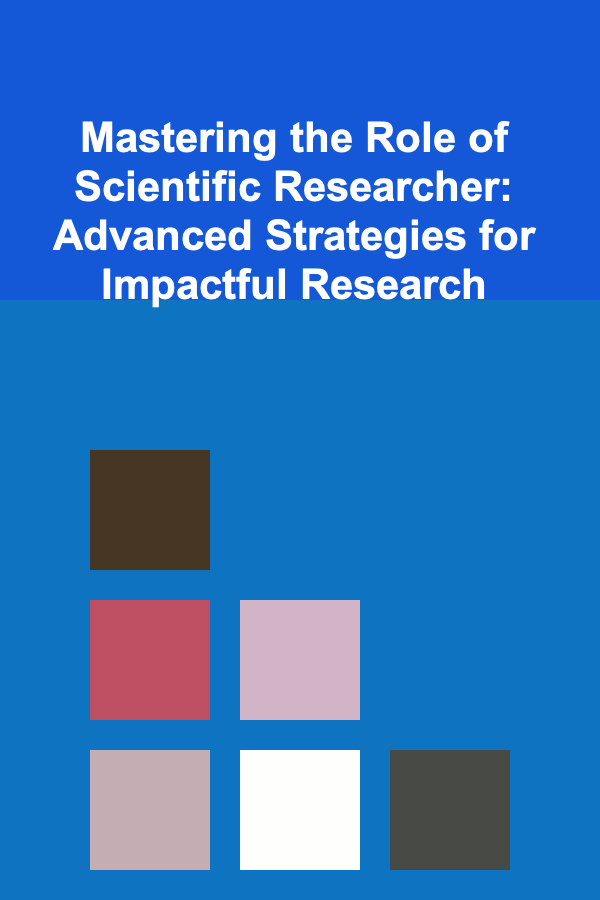
Mastering the Role of Scientific Researcher: Advanced Strategies for Impactful Research
ebook include PDF & Audio bundle (Micro Guide)
$12.99$10.99
Limited Time Offer! Order within the next:

Being a scientific researcher is not just about gathering data, conducting experiments, and publishing results. It involves the continuous development of expertise, intellectual rigor, and the ability to communicate complex ideas in clear and impactful ways. In today's rapidly evolving academic and research environments, mastering the role of a scientific researcher requires more than just technical proficiency; it demands a strategic approach to research design, collaboration, career development, and dissemination.
This actionable guide is designed for advanced researchers who seek to refine their skills and amplify the impact of their work. It will explore the strategies that enable researchers to perform at the highest level, from cultivating a growth mindset to developing research projects that make a lasting contribution to the scientific community.
Cultivating a Researcher's Mindset: Foundation of Impactful Science
A researcher's mindset is perhaps the most fundamental factor in achieving success. It shapes how you approach problems, handle setbacks, and interact with the broader scientific community.
1. Intellectual Curiosity and Open-mindedness
Great researchers have an innate curiosity to understand the world around them, but they also maintain a mindset of openness. This is not simply about asking questions---it's about being willing to accept that knowledge may not always follow a straightforward path.
- Challenge assumptions: Don't accept conventional wisdom just because it's widely accepted. Look for gaps in current theories or unexplained phenomena that might provide the foundation for groundbreaking research.
- Pursue interdisciplinary insights: Engaging with fields outside your own can provide fresh perspectives and novel approaches to problems that have been studied extensively within your field.
2. Resilience and Adaptability
Scientific research is often a slow, iterative process, where failure is just as common as success. The ability to cope with setbacks is a crucial skill.
- Learn from failure: Every failed experiment or negative result is an opportunity for learning. Understand why an experiment didn't work and adjust your approach accordingly.
- Stay flexible: Adapt your research methodology when new data suggests different directions. Being rigid in your approach can hinder creativity and stifle innovation.
3. Critical Thinking and Analytical Rigor
Science thrives on careful analysis, data interpretation, and the constant questioning of results. Researchers should always scrutinize their findings and interpretations.
- Engage in skepticism: Even when the results seem clear, ask yourself whether alternative explanations exist. This prevents biases and ensures the integrity of your conclusions.
- Maintain a systems-thinking approach: Consider how various elements within your research ecosystem interconnect. This approach can reveal hidden variables or potential confounders that could influence results.
Designing Robust and Impactful Research
To have a significant impact, research must be well thought out, methodologically sound, and capable of advancing knowledge in your area of expertise. Below are strategies for designing research that can withstand scrutiny and contribute to the broader scientific conversation.
1. Defining Clear, Meaningful Research Questions
A well-defined research question is the cornerstone of impactful research. It guides the entire project, from methodology to data interpretation.
- Focus on the "Why" and the "How": Rather than just describing phenomena, aim to understand underlying mechanisms, causes, or relationships.
- Align with existing gaps: Conduct a thorough literature review to identify unanswered questions or areas where current theories are insufficient. This will ensure your research adds value to the field.
2. Adopting a Robust Methodological Framework
The methodology you select determines the quality of your results and their reproducibility. The key is to choose an approach that is appropriate for your research question, ensuring that data collection and analysis are as accurate and objective as possible.
- Use mixed methods: Combining qualitative and quantitative approaches allows for a more nuanced understanding of complex phenomena. Qualitative methods provide rich contextual data, while quantitative methods offer empirical evidence.
- Consider reproducibility and transparency: In today's research landscape, reproducibility is critical. Clearly document your methodology, and consider open-sourcing your data or analysis scripts to allow others to replicate your findings.
3. Leveraging Advanced Data Analysis Techniques
With the growing availability of big data and complex computational tools, researchers must be adept at analyzing large, diverse datasets to extract meaningful insights.
- Learn data science techniques: Familiarity with statistical modeling, machine learning, and data visualization tools can help uncover patterns in data that traditional methods might miss.
- Ensure statistical rigor: Understand and apply advanced statistical techniques to ensure your results are statistically valid. Power analysis, confidence intervals, and effect sizes are crucial for robust conclusions.
4. Fostering Collaboration and Team Science
Collaborative research can exponentially increase the impact of your work by combining diverse expertise, methodologies, and resources. Team science, which brings together interdisciplinary researchers to tackle complex questions, is becoming increasingly common in modern scientific inquiry.
- Seek interdisciplinary partnerships: Collaboration with researchers from different fields can provide novel perspectives and open up new lines of inquiry.
- Leverage complementary skills: Ensure your research team includes individuals with diverse expertise---whether in data analysis, experimental design, or theory development---to address all aspects of the research comprehensively.
Maximizing the Impact of Your Research
Having completed your research, the next challenge is ensuring that it reaches the right audience and influences both the scientific community and society at large. The ability to disseminate and communicate your findings effectively is a key skill for an impactful researcher.
1. Publishing in High-Impact Journals
Publishing in reputable journals can significantly increase the visibility and influence of your research. High-impact journals often have a rigorous peer-review process that helps to validate the quality and relevance of your work.
- Target the right journals: Select journals that are well-respected in your field, but also consider interdisciplinary journals that may reach a broader audience.
- Craft an impactful abstract and introduction: The abstract and introduction of your paper are the first parts readers will engage with, so make them compelling. Clearly state the problem, your hypothesis, methodology, and key findings.
- Respond to reviewer feedback thoughtfully: Peer review is a crucial part of the publishing process. Be open to criticism and use it to improve the clarity and quality of your work.
2. Engaging with the Broader Scientific Community
Scientific research doesn't end with a published paper. To truly make an impact, you need to engage with the community beyond your immediate circle.
- Present your work at conferences: Conferences provide opportunities to share your findings with peers, receive feedback, and establish connections with potential collaborators.
- Use social media and professional platforms: Platforms like ResearchGate, Twitter, and LinkedIn allow you to share your research with a wider audience and participate in ongoing scientific conversations.
- Engage with policymakers and industry: If your research has practical applications, seek out opportunities to communicate with policymakers, industry leaders, or the public to ensure that your findings are put to use.
3. Disseminating to Non-Scientific Audiences
One of the most important ways to make a lasting impact is to ensure that your research reaches non-scientific audiences. Making complex ideas accessible to the public can influence societal change, policy decisions, and foster a greater appreciation for science.
- Write for general audiences: Blog posts, news articles, or op-eds can help bridge the gap between scientific communities and the general public.
- Collaborate with science communicators: Engage with journalists or science writers who can help present your findings in a way that resonates with broader audiences.
- Participate in outreach initiatives: Public lectures, school programs, or community science events are powerful ways to connect with society and inspire the next generation of researchers.
4. Building a Research Legacy
Your long-term impact as a researcher depends on your ability to leave a lasting legacy of knowledge and mentorship.
- Mentor emerging scientists: Invest in the next generation of researchers by providing guidance, sharing knowledge, and fostering a supportive research environment.
- Encourage replication and expansion of your work: Successful research often opens new avenues for further study. Support the replication of your work, and encourage other researchers to build upon your findings.
- Contribute to open science initiatives: Open science is about making research, data, and publications freely accessible to all. Supporting and engaging in these initiatives increases the reach and impact of your work.
Conclusion
Mastering the role of a scientific researcher is a multifaceted process that requires a combination of intellectual rigor, methodological precision, and strategic communication. By refining your research skills, fostering collaborations, and effectively disseminating your work, you can ensure that your research not only contributes to the scientific community but also impacts society. The key to becoming a master researcher lies in your commitment to continuous learning, adaptability, and a focus on making meaningful contributions to the world.
Reading More From Our Other Websites
- [Organization Tip 101] How to Keep Your Home Inventory Secure from Theft
- [Home Maintenance 101] How to Handle Emergency Home Repairs Without a Professional
- [Organization Tip 101] How to Build a Minimalist Home Library
- [Soap Making Tip 101] Why Your Soap is Too Soft or Too Hard: Balancing Oils and Lye
- [Rock Climbing Tip 101] How to Develop Knee‑Lock Techniques for Thin Crack Climbing on Sandstone
- [Home Storage Solution 101] How to Integrate Seamless Cable Management Solutions with Your Entertainment System and Tool Storage
- [Survival Kit 101] Best Survival Kit for Small Business Owners Preparing for Office Shut‑downs
- [Home Security 101] How to Install a Hidden Safe in Your Home
- [Small Business 101] Why Small Business Accounting Software Is Crucial for Managing Your Finances
- [Home Maintenance 101] How to Perform Regular Maintenance on Your Home's Appliances

How to Declutter Sentimental Items Without Guilt
Read More
How to Organize Bathroom Products for a Spa-like Feel
Read More
How to Secure Your Home When You Live in a Rental
Read More
How to Use Accent Lighting to Elevate Your Space
Read More
How to Use Vintage Jars for Stylish Organization
Read More
Saving Money on Home Meal Delivery Services: A Complete Guide
Read MoreOther Products

How to Declutter Sentimental Items Without Guilt
Read More
How to Organize Bathroom Products for a Spa-like Feel
Read More
How to Secure Your Home When You Live in a Rental
Read More
How to Use Accent Lighting to Elevate Your Space
Read More
How to Use Vintage Jars for Stylish Organization
Read More